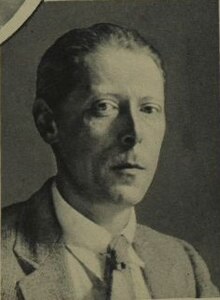Albert Inkpin
Albert Inkpin | |
|---|---|
 | |
| 1st General Secretary of the Communist Party of Great Britain | |
| In office 31 July 1920 – July 1928 | |
| Chair | Arthur MacManus |
| Preceded by | Position established |
| Succeeded by | J. R. Campbell |
| Personal details | |
| Born | Albert Samuel Inkpin 16 June 1884 Haggerston, London, United Kingdom |
| Died | 29 March 1944 (aged 59) |
| Cause of death | Cancer |
| Spouse |
Julia Raven (m. 1910) |
| Children | 3 |
| Education | St Paul’s School, Hackney |
Albert Samuel Inkpin, (also written Inkpen)
Biography
Early years
Albert Inkpin was born on 16 June 1884 in
In 1913 Inkpin was elected General Secretary of the BSP. He was a committed internationalist and
Inkpin and the more radical elements were thus in a position of firm control of the BSP organisation after 1916. He represented the organisation at the foundation of the Hands Off Russia movement, in 1919. He supported the unity discussions which led to the formation of the Communist Party of Great Britain, in 1920.[2]
Communist leader
Albert Inkpin was Secretary of the Joint Provisional Committee of the Communist Party, the group of representatives of member organisations who set the agenda for the upcoming founding congress. This convention was held in London over the weekend 31 July to 1 August 1920 and was attended by 160 delegates, presenting 211 mandates.[5] These delegates included his wife, Julia, and brother, Harry.[2] Inkpin delivered the keynote address to the gathering and was elected to the governing Central Committee of the new political organisation, becoming General Secretary.[6]
Inkpin was named a member of the honorary presidium of the
Inkpin emerged from jail to become the CPGB's National Organiser, but reverted to being General Secretary the following year. As was the case with top leaders of the early
In 1925 Inkpin was again imprisoned, this time as one of 12 prominent Communists charged under the
Inkpin stood down as General Secretary in 1929, to be replaced by

In September 1942, Inkpin became ill with cancer, and although he continued working and remained secretary of the British offshoot of the Friends of the Soviet Union, the Russia Today Society, he did not recover, and died in March 1944.[2] He was cremated at Golders Green Crematorium.
Footnotes
- ^ "Conviction, Albert Inkpen". Hansard. 150. 13 February 1922. Retrieved 15 November 2021.
- ^ a b c d e f Richard Temple, "Inkpin, Albert Samuel", Dictionary of Labour Biography, vol.XIV, pp.180–188
- ^ Solon DeLeon (ed.), The American Labor Who's Who, pg. 292.
- ^ a b DeLeon (ed.), The American Labor Who's Who, pg. 292.
- ^ James Klugmann, History of the Communist Party of Great Britain: Volume 1: Formation and Early Years, 1919-1924. London: Lawrence and Wishart, 1968. Page 38. Klugmann notes that the official report of the proceedings stated 152 delegates were in attendance, but listed 157.
- ^ Graham Stevenson '"Albert Inkpin" Archived 2010-03-28 at the Wayback Machine, Compendium of Communist Biography. Retrieved 30 August 2009.
Publications by Albert Inkpin
- "Re-Establishing" the Second International: The Communist Party of Great Britain Replies to a Letter of Appeal Signed by Arthur Henderson (for the British Labour Party), J.H. Thomas and Harry Gosling (for the Trades Union Congress), and J. Ramsay MacDonald (for the Second International). London: Communist Party of Great Britain, n.d. [c. 1921].
- The Glory of Stalingrad. London: Russia Today Society, 1942.
- Friends of the USSR: The Story of the Russia Today Society. London: Russia Today Society, n.d. [1942].
External links
- Inkpin Archive, Marxists Internet Archive, www.marxists.org.
- Graham Stevenson, "Albert Inkpin", Compendium of Communist Biography.
- Steve Reynolds, "The Early Years of the Communist Party of Great Britain - 1922-1925", In Defense of Marxism website, www.marxist.com
